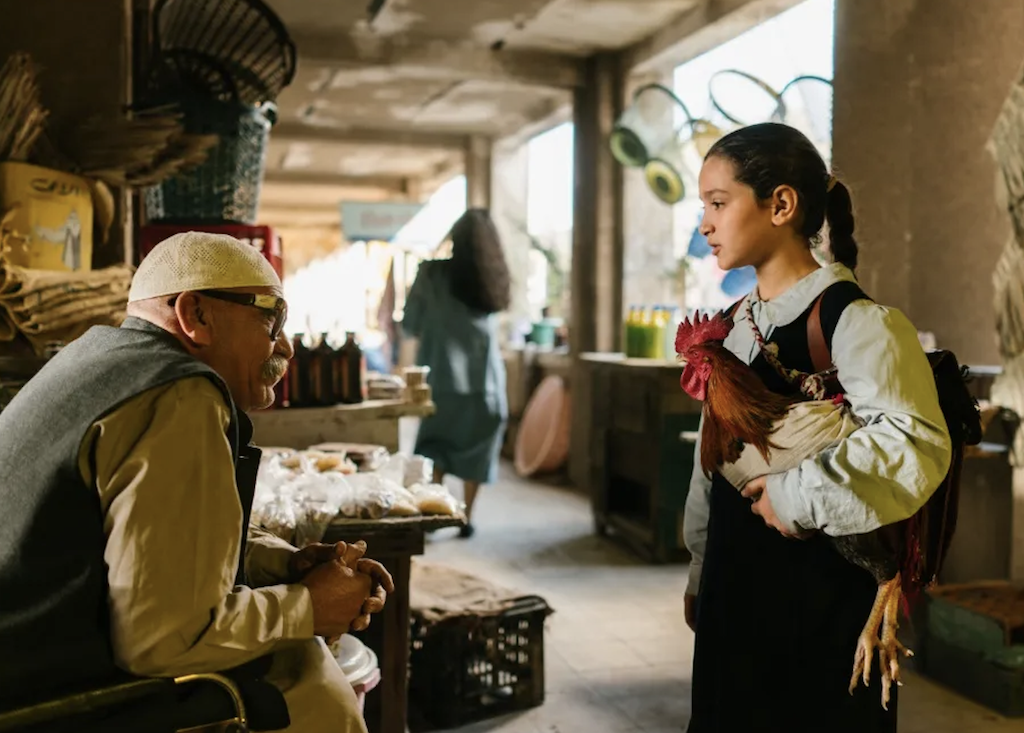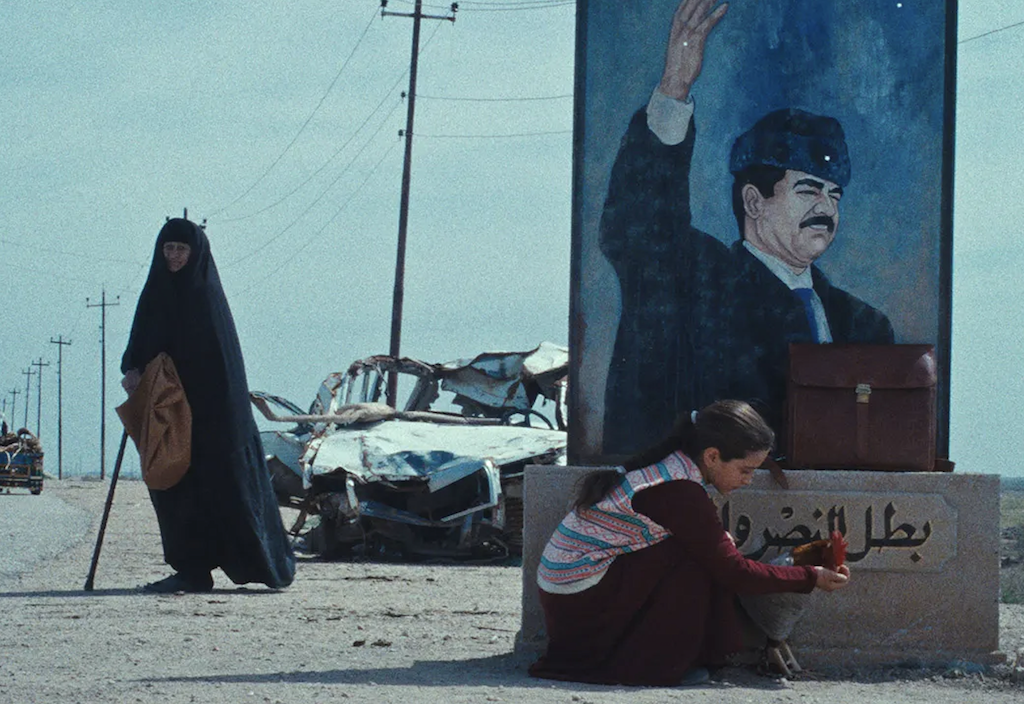A Taste of The President’s Cake
The new film The President’s Cake is both entertaining and compelling, but only if you know little about Iraq.

Still from The President’s Cake. (Sony Pictures Classics)
On a recent afternoon in Baghdad, I drove across the Republic Bridge to an emporium on the eastern bank of the Tigris. A new Iraqi film that recently screened at Festival de Cannes is finally at the theater, and I, not without a moment of trepidation, decided to go see it. The bridge was a casualty of a bombing campaign that, in the words of former US secretary of state James Baker, sent Iraq back to the preindustrial age in 1991. Bridges collapsed, as Beat poet Sargon Boulus once wrote, “like the ribs of a murdered God over the Tigris and the Euphrates.” Zayouna Mall bears the name of a bourgeois neighborhood near Ismaʿil Fattah’s Monument to the Martyr, a turquoise split-dome commissioned in the 1980s by the Baʿathist regime in honor of the soldiers perished in the senseless war with Iran. It loomed under a polluted sky to my left.
Twenty-two years after the Saddam Hussein regime was toppled in 2003, Baghdad remains a fallen city. Palestine Street, the highway leading to the mall, resembled a forsaken film set, with abandoned security barriers, skeletal watchtowers, haggard beggars, and illegible outlines of slogans gone obsolete dotting the landscape.
The mall is an imposing, heinous edifice, jutting from the main street among modernist villas mutilated and spoliated by the new occupants in town. Eastern Baghdad is a militia playground that, as Derek Gregory once wrote, emptied its middle class and adorned itself in a Shia garment by sectarian cleansing. Inside, the shopping center was empty and claustrophobic. I took a stained capsule elevator and ordered a ticket from a smiling Rita — a human relic from the Christian communities driven, like so many Iraqis, by violence to, again as Boulus would say, Australia, Sweden, heaven, or hell.
I asked a young usher if he knew where the emergency exit was. A few weeks earlier, a similar venue was engulfed in infernal flames. Dozens died in the limboed town of al-Kut. There were none, he told me. “Go down this escalator, straight ahead, then turn left towards the parking lot.” But I wouldn’t make it, he assured me. “We’d die together.”
I remembered his words as a barrage of advertisements emerged from the screen to storm the vacant theater where I sat amid empty chairs. It would be a terrible death, I thought, pitying myself. A handful of youth walked in, occupying a few crimson seats in the audience.
The film opens with roaring fighter jets piercing into an indigo sky. The waters below are calm, the palm trees unshaken. Far ahead is the gulf, of which the doyen of modern Arabic poetry, Badr Shakir al-Sayyab, wrote his poem, Rain Song: “Oh Gulf! Giver of pearls, shells and death.”
This idyllic setting is a marshland in the south of Hussein’s Iraq, now an overrun front, an open necropolis for retreating soldiers routed by the Americans from Kuwait only to face a rebellion backed by Iran, a vaticinium ex eventu to a project vindicated today.
The last rattles of war are heard; bombers fly overhead, patrolling a no-fly zone, but the camera forgoes its spectacular visuals to follow the mundane. Marsh people line up before a water truck, clutching jerricans in hand. Grocers ply vegetables on the ground. It is a time of scarcity, one jerrican for each.
So opens Hasan Hadi’s debut feature, The President’s Cake, a beautifully shot tragicomedy that won the Caméra d’Or at the festival’s parallel section, the Directors’ Fortnight. In it, Operation Desert Storm is over. The Security Council’s Resolution 661, passed after Hussein’s August 1990 blitzkrieg, is already in effect. Chapter VII is invoked, trade dealings with Iraq are verboten. The intifada is subdued; time came for a broken nation to celebrate Hussein’s birthday over mounds of human debris.
The picture tells the familiar story of Baʿath authoritarianism through the eyes of Lamiʿa, a witty nine-year-old whose teacher awards her the “honor” of preparing a cake for her classmates on the eve of the president’s birthday. She lives with her grandmother, whom she calls bibi, along with her rooster, Hindi.
Lamiʿa (Baneen Ahmad Nayef) is a luminous student, with a forlorn look in her eyes. She is an orphan, splitting her days between taking her canoe to school and helping bibi cook. This is Mamlakat al-Qassab, the “Kingdom of Reed” where Khalid Ahmad Zaki led a doomed Maoist revolt in 1968. The wetland shimmers in the night lights, a mournful ʿoud sings an elegy to a time at a standstill.

At school, the teacher is a grotesque character and a yes man, stealing Lamiʿa’s lunch and warning the schoolchildren against the abominable sin of skipping the president’s birthday. He’d write a report, he says — a burlesque caricature of what seems to be an inherently corrupt society.
Besieged by this ill fate, Lamiʿa and her grandmother gather their valuables and set out on a trip to procure the cake’s ingredients. On a deserted road, they stand by a mural of their triumphant leader, next to a carcass of a car dumped on the side of the road. They hitchhike a ride “to the city.”
Jasim, played by the familiar face of lute player Rahim AlHaj, picks them up in his wagon. A compassionate soul in what Italo Calvino would describe as the “inferno of the living,” Jasim is a mailman. In his passenger seat sits a blinded groom returning patched-up from the front.
Baghdad is far away and frightening. One imagines that by al-Madina (Arabic for “city”), bibi means Basra, Amara, or Nasiriyah, close urban centers with bustling souqs (marketplaces), to fetch what her granddaughter needs. Instead, Hadi forgoes common sense for the picturesque, sending them off to a capital of domes, arched hallways, and domesticated modernism.
It is there that bibi’s intentions come to light. Penniless and ill, she takes Lamiʿa to meet her would-be foster mom. She had decided to give the girl away. Lamiʿa, realizing the futility of her pleas, flees to the riverbank, from which she ventures to see her neighbor and classmate Saʿid (Sajad Mohamad Qasem), a pickpocket at a nearby playground.
Despite being nine-year-old southerners, the glowing pair navigate the nooks of the metropolis with ease. Parted with Lamiʿa, bibi runs amok, shouting from door to door at a police station. She wants her granddaughter found but instead is somehow shooed away by mustachioed officers preoccupied with Hussein’s birthday.
The old woman is disparaged as imʿediyyah, a condensation of the treacherous miʿdan, the indigenous dwellers of Mesopotamia’s ancient wetlands with whom the regime has long been at odds. As Joseph Sassoon writes in Saddam Hussein’s Ba‘th Party: Inside an Authoritarian Regime, in “the marshes, there were almost daily attacks during the period following the invasion of Kuwait and the uprising that took place in 1991.”
Soon bibi and Jasim cross paths anew, and the well-connected mailman helps her report her missing granddaughter before she collapses on the floor and is taken to a hectic hospital in town. As at the police station, everyone shouts, and the corridors are still filled with wounded bodies long after major military operations have concluded.
It is a rotten society in which everyone takes bribes. Hadi seems ahead of himself here, confusing today’s Iraq with that of the past. Corruption was not a widespread phenomenon in the country in the 1990s; it was brought en masse to Iraq in 2003. As Joy Gordon writes in Invisible War: The United States and the Iraq Sanctions:
Blame was often placed as well on the corruption of the Iraqi government, on the grounds that Hussein was using Iraq’s funds, illicit income from smuggling, and proceeds from the Oil-for-Food Programme to buy luxury goods for himself, his cronies, and privileged groups in Iraq. But in fact these practices had only a marginal effect on Iraq’s economy. The real damage to Iraq’s economy and society was not from Hussein’s neglect or corruption but from the systematic impoverishment of the entire nation.
In the dreary labyrinth of Baghdad, there is no decent man in sight. Lamiʿa and Saʿid encounter an obese grocer who rapes a pregnant woman in the back of his store; a duplicitous antiques dealer later buys her late father’s watch with fake bills.
Lamiʿa’s rooster is stolen at, of all places, a mosque. When she finds Hindi at a butcher’s store, the soft-spoken owner turns out to be a pedophile. He takes her to one of the shoddy cinemas whose operators, once the sanctions sentenced the old core to social death, offered pornographic films to survive. She flees and is captured by policemen. Jasim, now looking for her, eventually brings her to bibi’s hospital bed. They find it empty, save for her cane. Lamiʿa’s world closes in and shrinks. Baghdad is a lonely place. Jasim drives Lamiʿa home with her grandmother’s coffin on top.
This stigmatization of the old core of the Iraqi capital is shared with the current regime in Baghdad, which seems to be following the Gulf emirates in pushing the working-class away from a historic center, gentrified for white and Chinese tourists to marvel at the commodified heritage unbothered. Still, the film offers a heart-wrenching, tumultuous odyssey of micro-events. After the burial, Saʿid’s mother helps her make the cake, and Hadi belatedly realizes that kindness still exists.
The next day at school, the obscene teacher, dressed up in party fatigues like a stooge, savors its layered geymer (buffalo milk cream) in glee. An ear-splitting explosion follows; a wall comes down. Lamiʿa and Saʿid take cover under their desks, playing a staring contest to make the war go away. Alas, it never will. Happy birthday indeed.
The President’s Cake is both entertaining and compelling, but only if you are ignorant about Iraq. Social maladies exist, but the film rehearses known stereotypes and corresponds to little that is real. Instead, it fulfills misconceptions of morbid Oriental cities reduced by despotic regimes to decadent theaters for the corrupt. The dialogues are odd, a mishmash of accents that is not quite right. Humans are prone to evil; not even the youngsters are spared. On a scenic rooftop, they taunt each other with the ill fates of their fathers, one disabled and begging at an amusement park, the other missing.
Its success at Cannes should come as no surprise, nor should its failure to attract a full house at home: Hadi seems to have ripped a page from One Thousand and One Nights for his script. At one point, the mischievous duo stray into a shabby café on al-Rashid Street, where a quintessential sequence unfolds of a young lady singing to a clientele of men. He might as well borrow a Nouvelle Vague intertitle with “Visit Iraq” written on it to drive the point home. But by ticking the boxes for his Western audience, Hadi wobbles into a territory where the ethics of representation blur.
The dictator is no more, and neither are Iraq’s wetlands. But what of the present? Many have taken his place. From their own murals, their ominous looks scrutinize and intimidate. The victims of their lethal failure, from Mosul to Sinjar to the sectarian killings condemned to oblivion, populate lists that remain open and waiting. Iraq’s agony never ceased after 2003, and exorcising yesteryear’s ghosts turns a blind eye to the ruined future we inhabit today.